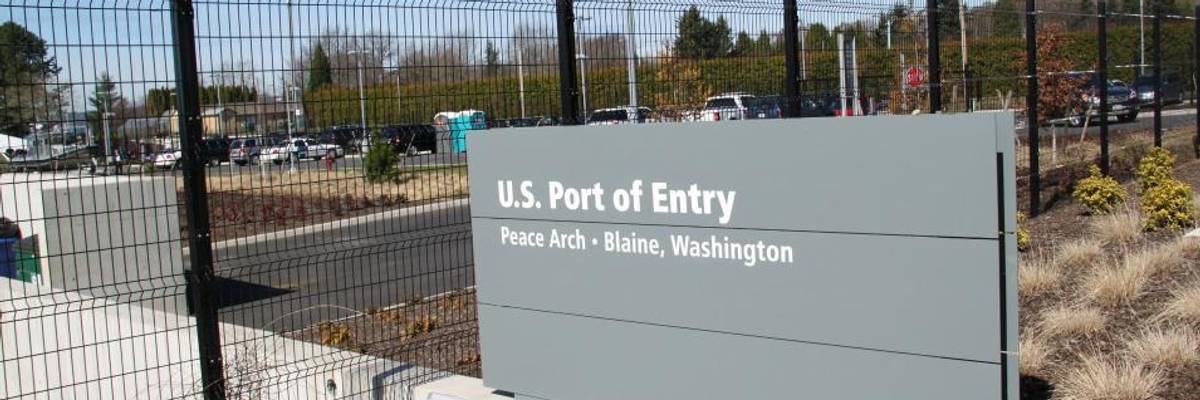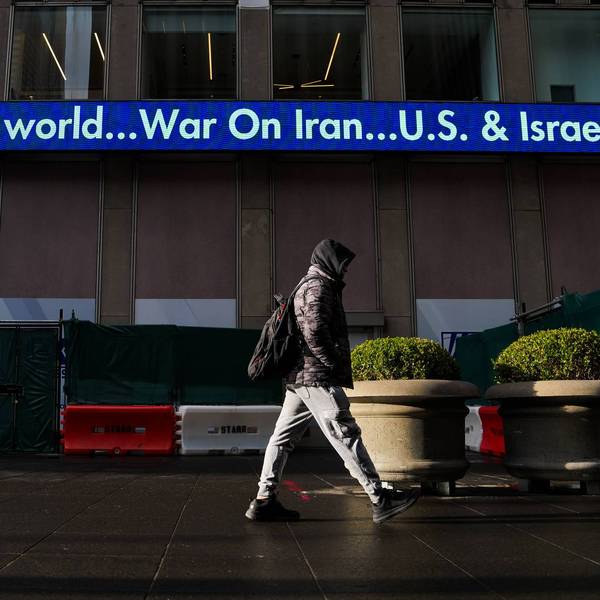
In the state of Washington this weekend, U.S. border authorities summarily detained and interrogated Iranian Americans and lawful permanent residents who were on their way home from Canada. (Photo: U.S. Embassy Canada)
Iranian Americans Have Rights, Too--No Matter What's Happening Abroad
Military action abroad does not justify discrimination at home.
Like most Iranian Americans, my family immigrated to the United States in the aftermath of the 1979 revolution in Iran, hoping to find safety and acceptance in a country that prides itself on diversity and freedom of expression. We learned and embraced the principles of the Constitution, including freedom of speech and religion, due process, and equal protection--protections that apply to every person, citizen and non-citizen alike. But what happened at the U.S. border this past weekend was a painful reminder that sometimes, we are still considered outsiders.
In the state of Washington this weekend, U.S. border authorities summarily detained and interrogated Iranian Americans and lawful permanent residents who were on their way home from Canada. Many were returning from holiday trips to visit family in Vancouver, which is also home to a large Iranian community. Many had gone there for a pop concert. Many were simply on vacation. But that's not the point. The point is that these people--families, young and old, even small children--were singled out because of their Iranian heritage.
The news is highly disturbing, but it isn't the first time Iranian Americans have faced discrimination based on political tensions outside of our control. Nor is it the first time border and law enforcement officers have conducted unmerited abuses targeting vulnerable communities. We've seen the government abuse the rights of Americans of Somali, Afghan, and Pakistani descent following military action as well. But amid the anti-immigrant, Constitution-flouting policies of the current administration, this news was chilling.
The government has the authority to question travelers to verify identity, citizenship, or legal status, and to conduct reasonable searches for contraband. The government cannot, however, question them about their political views, associations with others, and religious beliefs. That raises serious First Amendment concerns. Everyone has basic constitutional protections at the border and ports of entry--and U.S. citizens and lawful residents cannot be denied entry if they refuse to answer such questions.
This administration continuously espouses anti-immigrant rhetoric and follows up with unconscionable abuses--the Muslim ban, family separation, the inhumane detention of children, and many more. It has upended many immigrants' lives through denaturalization and rescinding Temporary Protected Status, as well. The ACLU has long raised concerns about discriminatory questioning and detention at the border, and our concerns are particularly heightened in the current political climate.
As political tensions continue to flare between the U.S. and Iran, it is important to know our rights--and assert them.
The Constitution guarantees equal protection under the law and protects against discriminatory profiling and violations of First Amendment rights. We cannot allow actions abroad to be exploited as justifications for illegal and unfair discrimination at home.
An Urgent Message From Our Co-Founder
Dear Common Dreams reader, The U.S. is on a fast track to authoritarianism like nothing I've ever seen. Meanwhile, corporate news outlets are utterly capitulating to Trump, twisting their coverage to avoid drawing his ire while lining up to stuff cash in his pockets. That's why I believe that Common Dreams is doing the best and most consequential reporting that we've ever done. Our small but mighty team is a progressive reporting powerhouse, covering the news every day that the corporate media never will. Our mission has always been simple: To inform. To inspire. And to ignite change for the common good. Now here's the key piece that I want all our readers to understand: None of this would be possible without your financial support. That's not just some fundraising cliche. It's the absolute and literal truth. We don't accept corporate advertising and never will. We don't have a paywall because we don't think people should be blocked from critical news based on their ability to pay. Everything we do is funded by the donations of readers like you. Will you donate now to help power the nonprofit, independent reporting of Common Dreams? Thank you for being a vital member of our community. Together, we can keep independent journalism alive when it’s needed most. - Craig Brown, Co-founder |
Like most Iranian Americans, my family immigrated to the United States in the aftermath of the 1979 revolution in Iran, hoping to find safety and acceptance in a country that prides itself on diversity and freedom of expression. We learned and embraced the principles of the Constitution, including freedom of speech and religion, due process, and equal protection--protections that apply to every person, citizen and non-citizen alike. But what happened at the U.S. border this past weekend was a painful reminder that sometimes, we are still considered outsiders.
In the state of Washington this weekend, U.S. border authorities summarily detained and interrogated Iranian Americans and lawful permanent residents who were on their way home from Canada. Many were returning from holiday trips to visit family in Vancouver, which is also home to a large Iranian community. Many had gone there for a pop concert. Many were simply on vacation. But that's not the point. The point is that these people--families, young and old, even small children--were singled out because of their Iranian heritage.
The news is highly disturbing, but it isn't the first time Iranian Americans have faced discrimination based on political tensions outside of our control. Nor is it the first time border and law enforcement officers have conducted unmerited abuses targeting vulnerable communities. We've seen the government abuse the rights of Americans of Somali, Afghan, and Pakistani descent following military action as well. But amid the anti-immigrant, Constitution-flouting policies of the current administration, this news was chilling.
The government has the authority to question travelers to verify identity, citizenship, or legal status, and to conduct reasonable searches for contraband. The government cannot, however, question them about their political views, associations with others, and religious beliefs. That raises serious First Amendment concerns. Everyone has basic constitutional protections at the border and ports of entry--and U.S. citizens and lawful residents cannot be denied entry if they refuse to answer such questions.
This administration continuously espouses anti-immigrant rhetoric and follows up with unconscionable abuses--the Muslim ban, family separation, the inhumane detention of children, and many more. It has upended many immigrants' lives through denaturalization and rescinding Temporary Protected Status, as well. The ACLU has long raised concerns about discriminatory questioning and detention at the border, and our concerns are particularly heightened in the current political climate.
As political tensions continue to flare between the U.S. and Iran, it is important to know our rights--and assert them.
The Constitution guarantees equal protection under the law and protects against discriminatory profiling and violations of First Amendment rights. We cannot allow actions abroad to be exploited as justifications for illegal and unfair discrimination at home.
Like most Iranian Americans, my family immigrated to the United States in the aftermath of the 1979 revolution in Iran, hoping to find safety and acceptance in a country that prides itself on diversity and freedom of expression. We learned and embraced the principles of the Constitution, including freedom of speech and religion, due process, and equal protection--protections that apply to every person, citizen and non-citizen alike. But what happened at the U.S. border this past weekend was a painful reminder that sometimes, we are still considered outsiders.
In the state of Washington this weekend, U.S. border authorities summarily detained and interrogated Iranian Americans and lawful permanent residents who were on their way home from Canada. Many were returning from holiday trips to visit family in Vancouver, which is also home to a large Iranian community. Many had gone there for a pop concert. Many were simply on vacation. But that's not the point. The point is that these people--families, young and old, even small children--were singled out because of their Iranian heritage.
The news is highly disturbing, but it isn't the first time Iranian Americans have faced discrimination based on political tensions outside of our control. Nor is it the first time border and law enforcement officers have conducted unmerited abuses targeting vulnerable communities. We've seen the government abuse the rights of Americans of Somali, Afghan, and Pakistani descent following military action as well. But amid the anti-immigrant, Constitution-flouting policies of the current administration, this news was chilling.
The government has the authority to question travelers to verify identity, citizenship, or legal status, and to conduct reasonable searches for contraband. The government cannot, however, question them about their political views, associations with others, and religious beliefs. That raises serious First Amendment concerns. Everyone has basic constitutional protections at the border and ports of entry--and U.S. citizens and lawful residents cannot be denied entry if they refuse to answer such questions.
This administration continuously espouses anti-immigrant rhetoric and follows up with unconscionable abuses--the Muslim ban, family separation, the inhumane detention of children, and many more. It has upended many immigrants' lives through denaturalization and rescinding Temporary Protected Status, as well. The ACLU has long raised concerns about discriminatory questioning and detention at the border, and our concerns are particularly heightened in the current political climate.
As political tensions continue to flare between the U.S. and Iran, it is important to know our rights--and assert them.
The Constitution guarantees equal protection under the law and protects against discriminatory profiling and violations of First Amendment rights. We cannot allow actions abroad to be exploited as justifications for illegal and unfair discrimination at home.

